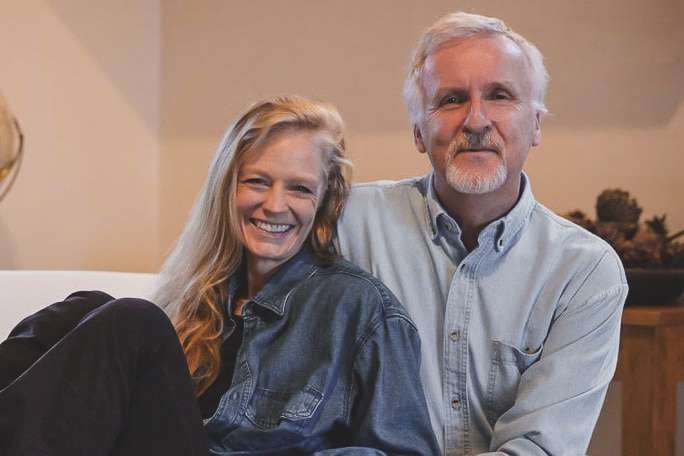The celebrity-backed Muse Virtual school—started by A-listers Suzy Amis Cameron and her husband James Cameron—brings sustainability to remote learning with a public school initiative.
If you ask Suzy Amis Cameron about her life’s purpose, she’ll crack a smile, even during the biggest health crisis of our time.
The actress-turned-eco-entrepreneur has a lot to smile about. She’s got her hands in a lot of pots—but they’re all mixing up bits of an interconnected story. There’s her campaign and book about eating plant-based, One Meal a Day; there’s the celebrity favorite come awards season: the eco Red Carpet Green Dress initiative; a plant-based pea protein processing facility in Canada; a family of five kids; and a hard-working husband you’ve probably heard of: Avatar and Titanic director James (“Jim”) Cameron. But it may be Amis Cameron’s work in reimagining primary education that will be her biggest legacy.
Along with her husband and her sister Rebecca, Amis Cameron helms the Muse School in Calabasas, California, located on the hilly outer edges of LA’s Santa Monica mountains. But these days, the school can be accessed from anywhere on the planet. Muse took its innovative learning model online—Muse Virtual—after covid lockdown closed in-person learning.
Last year, the once pricey private school announced a new partnership program with public school districts across the country. It offers coursework in performing arts, visual arts, seed-to-table, and plant-based cooking among other offerings, including afterschool programs.
“Muse Virtual Students are flourishing through remote learning! We want to bring the same opportunity to public school districts across the country during the 2021-2022 academic school year. This experience will enhance remote learning for public school students at a time when it is needed most,” Suzanne McClure, Director of MUSE Virtual, said in a statement.
“My personal mission statement is to make the world a better place for all of our children.”
-Suzy Amis Cameron
To truly understand Muse, you need to travel back to a pivotal moment for Amis Cameron. Plant-based food is a big part of the story—both in Suzy and Jim’s personal evolution and why they went into childhood education.
Suzy went vegan in 2012 after watching the documentary Forks Over Knives. Jim, a longtime meat-eater, soon followed. They never looked back.
They’ve both used their Hollywood influence to bring awareness to the climate crisis—particularly diet’s role. It’s the impetus behind the One Meal a Day program Amis Cameron founded that encourages people to give up animal products and go vegan for just one meal every day. She also helms the Red Carpet Green Dress campaign that works with A-listers to get them to go sustainable with their award season wardrobes. Jim teamed up with Arnold Schwarzenegger in a 2016 WildAid ad pointing to the link between climate change and meat consumption. In 2019, he executive-produced the documentary The Game Changers, which looked at the health impact of plant-based diets on the world’s top athletes.
But as parents of five children collectively, the Muse school, and education in general, continue to be the couple’s biggest calling. “My personal mission statement is to make the world a better place for all of our children,” Amis Cameron told Ethos over a Zoom call. Muse is, well, her muse in that mission.
“Muse has been a journey,” she says. The eco school’s lush mountainous backdrop has always been a suited match to its lush curriculum—nurturing the students in passion-led education. The K-12 school focuses on the individual student rather than heavy cookie-cutter coursework models. For example, Muse may match kids with mentors in their aspirational career fields, steering them toward a better understanding and real-world experiences of what that career path may look like. The teachers will then build custom learning models to match that student’s needs and interests.
Muse takes a global approach to education, too. It indoctrinates the children toward living sustainably, and what their decisions today mean for others on the planet, as well as for their own children one day. This includes running the brick-and-mortar school on solar power, embracing low-impact design and environmentally sustainable elements, and favoring a plant-based diet on campus.
The power of the plate
In 2018, Amis Cameron authored One Meal a Day, an approach to eating for the planet inspired by the daily meal program at Muse. The school grows much of its own fresh fruits and vegetables and doesn’t serve any meat, eggs, or dairy on campus. According to Amis Cameron, making one meal a day entirely plant-based has a significant impact on the environment, about the difference in emissions saved in one cross-continental trip over the course of a year. Going plant-based is not bad for our health, either—at least in the bedroom. Jim told the Toronto Star in 2018 that a vegan diet could help put Viagra out of business.

The health benefits of a vegan diet are far and wide, as Jim explored in The Game Changers. Replacing meat and dairy with plants can impact cholesterol levels, brain and sleep function, heart and digestive health, and so much more.
Eating a plant-forward meal may be especially beneficial for children, too, many of whom rely on their schools for their main meal of the day. A healthy plant-forward approach has been embraced by public school systems including major cities New York and Los Angeles.
A global classroom
But, of course, covid changed everything. While school systems are heading back to in-person learning with few restrictions in the coming weeks, many families struggled over the last two years. Many relocated, and remote learning altered food access for the millions of students that relied on schools for hot meals.
Muse had already been exploring franchise models when the pandemic hit. The goal last year was to expand to new markets and bring that same global, future-forward eco approach it perfected in Calabasas to all corners of the world.
And as schools everywhere went online, Amis Cameron realized there was an opportunity to go global in this way.

“I talked with other parents whose kids were just losing their minds in [other] digital classrooms,” she says. “We realized we were experiencing the exact opposite [at Muse]. The teachers were happy, the children were happy, and parents were over the moon.”
The new model features its signature “5 Pillars”: Academics, Passion-Based Learning, Self-Efficacy, and Sustainability. The school has pivoted from a nonprofit to a for-profit model, which allows for investments so it can grow and scale the program. And with the shift to public school districts, it’s now opening up its progressive learning environment to students across all walks of life.
“We’ve got something really special here,” Amis Cameron says. Even though the Los Angeles school is now open again, Muse Virtual isn’t going anywhere anytime soon. “There’s just more need than ever before,” she says.
Muse Virtual
Demand for digital learning is exploding and is expected to hit record highs in the coming years. While in-person school systems scrambled to provide effective distance learning, most schools had no experience with the challenges of e-learning. Digital learning platforms that have perfected the model have become a haven for families struggling in modified classrooms.
But the pivot toward digital learning was already gaining steam over the last several decades. Credit in large part can go to the anti-vaccine movement. In some parts of the U.S., failure to follow required vaccine schedules without a valid medical excuse means children can’t be enrolled in public (or most private) schools. Many of those parents moved to states where they’re not mandatory. Or they went remote. And now, with vaccine controversy at an all-time high, those numbers are likely to increase, especially given Pfizer’s recent announcement that its vaccine is safe for children as young as 5 years old.

But the Camerons don’t see Muse Virtual as an anti-vaxxer school. They see it as part of the evolving world, Amis Cameron says. With companies moving toward keeping staff home-based even after the pandemic, families may find themselves moving further away from public schools to access more nature and those wide-open spaces that feel safer than cities these days.
“We don’t know what the future holds for these kids,” Amis Cameron says. “So we really just want to do the best we can to support them, wherever they are.”
For more information on Muse Virtual, visit the website.


